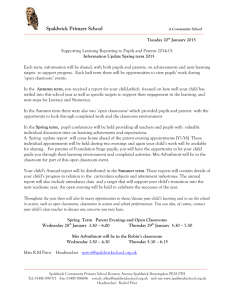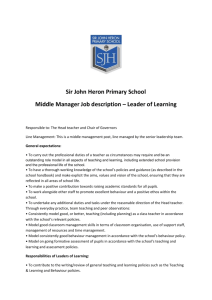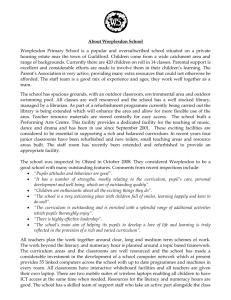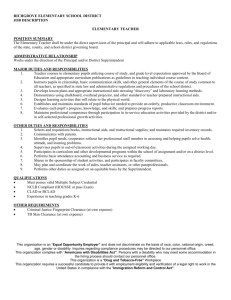Class and Classroom Allocation
advertisement
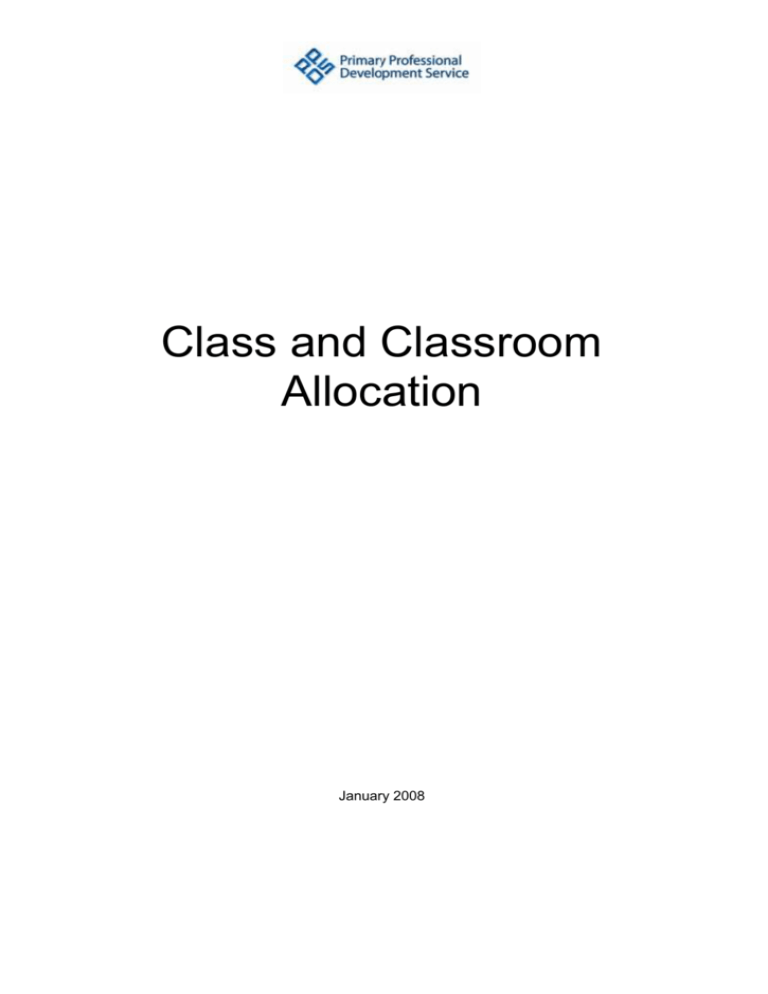
Class and Classroom Allocation January 2008 Class and Classroom Allocation Notice: This resource is intended to assist schools in devising their own procedures for class and classroom allocation. While every effort has been made to ensure the accuracy of the information provided, schools are advised to consult up to date circulars, recent legislation or guidelines from relevant agencies if they have specific queries regarding this topic. Background: The allocation of teaching duties within the school is a matter for the principal. The Education Act (1998) Section 22 (2) (d) (i) states that … subject to the terms of any applicable collective agreement and their contract of employment [teachers shall] carry out those duties that… are assigned to them by or at the discretion of the principal… Circular 16/73: 13. …he/she should arrange a fair distribution of teaching duties among the staff, taking into account the needs of the pupils and the abilities, experience, personality and preference of each teacher. He/she should utilise the services of staff with special qualifications or aptitudes in an organising or advisory capacity (CPSMA Management Board Members’ Handbook, 2007) Education Act (1998) Section 23: The Principal shall… (CPSMA Management Board Members’ Handbook, 2007) (c) be responsible for the creation, together with the board, parents of students and the teachers, of a school environment which is supportive of learning among the students and which promotes the professional development of the teachers, Leadership+ April 2007 Class Allocation: A guide to good practice p.10-11, and Principal’s right to allocate classes p.12-13 Questions the school may need to address: What do we understand by class allocation in the context of this school? o What classes? o For what timescale? o Does the allocation include Learning Support / Resource Teaching post(s)? o Other… Who is affected by this issue?/ In what way(s)? o Pupils o Parents – e.g. their concerns as to which classes will be split, the learning of the child in such situations, the time at which parents will be notified about such groupings etc. o Teaching staff o Other… Are there links to staff development that should be considered? e.g. o Motivation o Experience o Contribution to policy making in relation to teaching and learning o Opportunity for staff members to teach at all available levels o Opportunity for staff members to move from one situation to another o Opportunity for new learning o Opportunity for pupils to interact with different talents of staff o Personal professional development for individual staff members o Opportunities for development within the school context – e.g. mentoring, shared teaching, work preparation… 2 o Other… Other issues the school may need to address: o Is there a link to the school’s vision for pupils? What does the team offer to pupils at the end of 4/8years? e.g. access to all aspects of curriculum; holistic education; ability to benefit from further education; arts education; opportunity to benefit from interaction with various talents of staff members… o How are pupil needs identified? e.g. arising from pupil assessment…behaviour… interaction with other students… parent feedback… pupil feedback…teacher feedback…recommendations from Inspectorate… other… o Equitable distribution of workload from year to year – larger classes, preparation for sacraments… o Issues in relation to a particular group/class e.g. previous experience re frequency of teacher absences/maternity leave/other… o Age of the class group o Type of class – mixed/single etc. o Teacher expertise/experience/development… o Timing of class allocation each year? Method of doing so? e.g. Will staff be consulted? Will class allocation be based on previous experience within this school/in other schools? Or will it be based on offer of new learning opportunities? o Will classes with particular requirements be considered? e.g. communion, confirmation, other religious events; junior infants, sixth etc.? o Decisions when problems arise – if too many teachers opt for a particular class how will the issue be decided? e.g. lottery, previous experience, choice of previous year being accommodated etc.? o Are there any special circumstances in relation to teachers to be considered? e.g. newly appointed teacher, requirement for diploma, requirement to take the scrúdú cáilíochta, other… o Reporting to Board of Management: what and when? o Learning Support/Resource: These positions can be assigned within the staff in the same way as other classes are assigned. Where more than one person from the staff is interested in taking up a learning support or resource position, a Board of Management/Principal may want to facilitate an application procedure to give everyone an equal opportunity. If so, how will this be made known to all? Will it follow the same procedure as, for example, a post of responsibility? … letter of application, outline of previous experience, expertise, availability to attend any relevant courses; reason for applying for the position; interest in the area, other…. Will there be an interview? How will such be conducted? What criteria? By whom? Feedback to applicants? Will there be a limited time-span for remaining in a Learning Support/Resource position e.g. 1 year, 3 years etc.? o Consider issues in relation to allocation of classrooms/resource rooms Should pupils move? How often? Why? Should staff move? How often and why? Issues in relation to physical layout of rooms and location of room relative to other areas e.g. LS room, Library, ICT resources, Hall Is the room suitable? e.g. infant classes may need more space, play facilities … Are pupils with special needs considered when classrooms are being allocated? Are there issues that need to be considered when SNAs or other personnel are working in certain classrooms? Is there a need for specific equipment to be sited in certain classrooms? Furniture: Is the appropriate size for pupils in each room? Are there Health and Safety concerns that need to be considered? 3



![afl_mat[1]](http://s2.studylib.net/store/data/005387843_1-8371eaaba182de7da429cb4369cd28fc-300x300.png)
